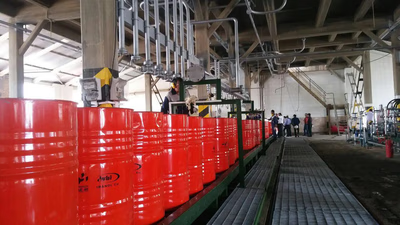
Engine oil lubricates machinery for optimal performance in trade.
Engine oil is primarily used to lubricate and protect the internal components of automotive engines. It forms a thin film between moving parts, reducing friction and wear. It helps prevent metal-to-metal contact, minimizing engine damage and extending the engine's lifespan. Engine oil also helps cool and clean the engine, by carrying away heat and contaminants. Engine oil is widely used in a range of industrial machinery, including generators, pumps, compressors, hydraulic systems, and heavy-duty equipment. It provides lubrication to moving parts, reducing friction, heat, and wear. Engine oil helps maintain optimal performance, prevents corrosion, and extends the operational life of industrial machinery.
Engine oil is used in various small engines, including lawnmowers, chainsaws, snow blowers, and portable generators. These engines benefit from engine oil's lubrication, cooling, and protection properties, ensuring reliable operation and longevity. It's important to note that different applications may require specific types or grades of engine oil. Manufacturers' recommendations and specifications should be followed to ensure proper lubrication and protection for the specific equipment or machinery. Regular maintenance, including oil changes at recommended intervals, is crucial to maintain optimal performance and extend the lifespan of the equipment.
The main functions of engine oil are: to lubricate the moving parts of the engine, to minimize friction and erosion, to help reduce heat and to absorb suspended particles and sludge deposits from combustion. Because engine oil has to do several things at the same time, it requires a complex chemical formulation, but you do not need to be a chemist or chemical engineer to know how to classify engine oil and how to choose the right type of engine oil for your car. Get acquainted (gain, obtain) with present-day techniques that came from Engine Oil.
Minimizes friction and wear between car engine parts. Contaminated sludge and sludge particles from the operation and combustion of the engine and keep the parts inside the engine clean, reduce the heat generated by the engine, cool the engine and through Sealing the parts makes the parts move smoothly. Therefore, suitable additives should be used to produce such oil. Bidomex uses American-American additives and French additives in its products.
Depending on the type of engine in terms of power and production speed, as well as alloys used in parts such as pistons, cylinders, valves or special rubber parts such as seals, washers, bearings and… suitable engine oil can lubricate and clean operations. Do it as correctly as possible. This engine oil is specified by the car manufacturer in the car manual. For example, Pride engine oil is fully explained in the car's manual.
Engine oil is used for the following purposes, including its main functions:
- Reduces friction between parts, which is called lubrication.
- Rinsing inside the engine, which minimizes rust on parts and equipment.
- Sealing between pistons and cylinders, which is what gasoline engine oils do well.
- Cooling of internal components. As you know, the engine heats up over time and the oil prevents the car from overheating.
Engine oil is essential for the proper functioning and maintenance of marine engines, including those used in boats, ships, and other watercraft. Marine engine oils are formulated to withstand the unique challenges of operating in marine environments, such as high humidity, saltwater exposure, and extended periods of idling. They provide lubrication, protection against corrosion, and help maintain engine performance in harsh marine conditions. Engine oil is used in power generation equipment, such as diesel generators and gas turbines. It lubricates the engine components, ensuring smooth operation and reducing friction-related issues. Engine oil also acts as a coolant, dissipating heat generated during operation.
Engine oil is vital for agricultural machinery, including tractors, combine harvesters, and irrigation pumps. These engines operate under heavy loads and demanding conditions. Engine oil provides lubrication, protects against wear, and ensures efficient performance in agricultural equipment. Construction and mining machinery, such as excavators, bulldozers, and dump trucks, rely on engine oil for optimal performance and durability. Engine oil lubricates the engine components, reducing friction, heat, and wear in these heavy-duty applications. Engine oil is used in recreational vehicles (RVs) and motorcycles to lubricate and protect their engines. RVs, motorhomes, and motorcycles require specific engine oils designed to meet their performance requirements and operating conditions.
-

Engine oil plays a crucial role in the lubrication and protection of automotive and industrial engines. It forms a protective film between moving parts, reducing friction and wear, which minimizes engine damage and extends lifespan. Engine oil also aids in cooling and cleaning by carrying away heat and contaminants. Various types of machinery, including generators, pumps, and heavy-duty equipment, rely on engine oil for optimal performance. Different applications necessitate specific grades of engine oil as per manufacturers" recommendations to ensure proper lubrication. Regular maintenance, including timely oil changes, is essential for maintaining performance and longevity. The primary functions of engine oil include lubrication to minimize friction, cooling internal components to prevent overheating, sealing between pistons and cylinders, and cleaning to reduce rust and sludge buildup. Marine engines require specialized oils that withstand harsh conditions like humidity and saltwater exposure.
Additionally, agricultural machinery, construction equipment, recreational vehicles (RVs), and motorcycles depend on tailored engine oils for efficient operation under demanding conditions. Understanding the specific needs of each application is vital for selecting the right engine oil. "
-

Motor oil production in West Asia is closely linked to global crude oil prices, as motor oils are derived from crude oil. Countries like Saudi Arabia, Iran, Iraq, and the UAE are significant players in this market. Their domestic oil production levels can influence the availability of crude oil for refining into motor oils, impacting production costs and prices. OPEC"s decisions on production levels also play a crucial role in shaping global oil prices, which directly affect motor oil pricing strategies in the region. The demand for motor oils globally is another critical factor; fluctuations can lead to changes in production levels and pricing strategies among West Asian producers. The region boasts advanced motor oil industries with established facilities that compete for both domestic and international market share. Factors such as government regulations, technological advancements, and varying regional market dynamics further influence production capabilities and pricing structures. Investments in refining infrastructure have enhanced the ability of these countries to process crude oil into high-quality motor oils efficiently.
Additionally, the diverse range of engine oils available—varying by type, viscosity, quality, and brand—contributes to a wide price spectrum in the market. As West Asia continues to innovate and adapt to changing market demands, its role as a key player in the global motor oil industry remains significant. "
-

Engine oils are essential for the lubrication and protection of various engine types, including gasoline, diesel, and high-performance engines. Each type of engine oil is formulated to meet specific operational demands, such as temperature extremes and high RPMs. Conventional mineral oils provide basic lubrication but may fall short under extreme conditions. In contrast, synthetic oils offer superior performance with enhanced thermal stability and oxidation resistance, making them ideal for modern and high-performance engines. Motorcycle oils cater to the unique requirements of two-stroke and four-stroke engines, while racing oils are designed for extreme conditions encountered in motorsports. Diesel engine oils contain additives to manage soot and wear due to higher compression ratios. The market offers a range of options including semi-synthetic blends that combine the benefits of both synthetic and conventional oils. High mileage oils are tailored for older engines, helping to condition seals and reduce oil consumption.
Engine oil classifications include Group III (mineral), Group IV (PAO), and Group V (esters). Industry standards from organizations like API ensure that these oils meet performance requirements for viscosity, oxidation resistance, and wear protection. The diverse market allows consumers to select products based on their specific needs, preferences, and budget.
-

Engine oil, essential for internal combustion engines, serves multiple functions including lubrication, cooling, and cleaning. It reduces friction and wear between moving parts, preventing damage and ensuring longevity. Engine oils are derived from mineral or synthetic bases, enhanced with additives for improved performance. Modern vehicles often feature oil life monitoring systems that optimize oil change intervals based on engine conditions. Synthetic oils outperform conventional oils in extreme temperatures and offer better fuel efficiency but come at a higher cost. Proper viscosity is crucial; it affects flow and protection under varying temperatures. Regular oil changes are necessary to maintain engine health. Additionally, used engine oil poses environmental risks if not recycled properly, necessitating adherence to disposal regulations. Understanding the specific requirements for different engines is vital for optimal performance.
-

Engine oils are categorized by viscosity grades like 5W-30 and 10W-40, indicating their flow resistance at varying temperatures. High-quality oils maintain viscosity, ensuring effective lubrication and protection under diverse conditions. They can be mineral or synthetic, with synthetic oils generally outperforming mineral ones in terms of lubrication, thermal stability, and oxidation resistance. Quality assessment involves performance testing for lubrication effectiveness, wear protection, and compatibility with emission systems. Selecting the right engine oil is crucial for maintaining engine health and efficiency; poor quality oil can lead to significant engine damage. Key considerations when purchasing include avoiding oils with black spots or unpleasant odors, checking for standard logos, ensuring freshness, and examining packaging quality. High-quality oils contain a balanced additive package that enhances performance by preventing sludge formation and reducing wear. The American Petroleum Institute (API) sets standards for engine oils; certification indicates compliance with industry requirements.
Original Equipment Manufacturers (OEMs) specify oil requirements to ensure compatibility with their engines. Adhering to international standards like ILSAC or ACEA further signifies a product"s quality. "





